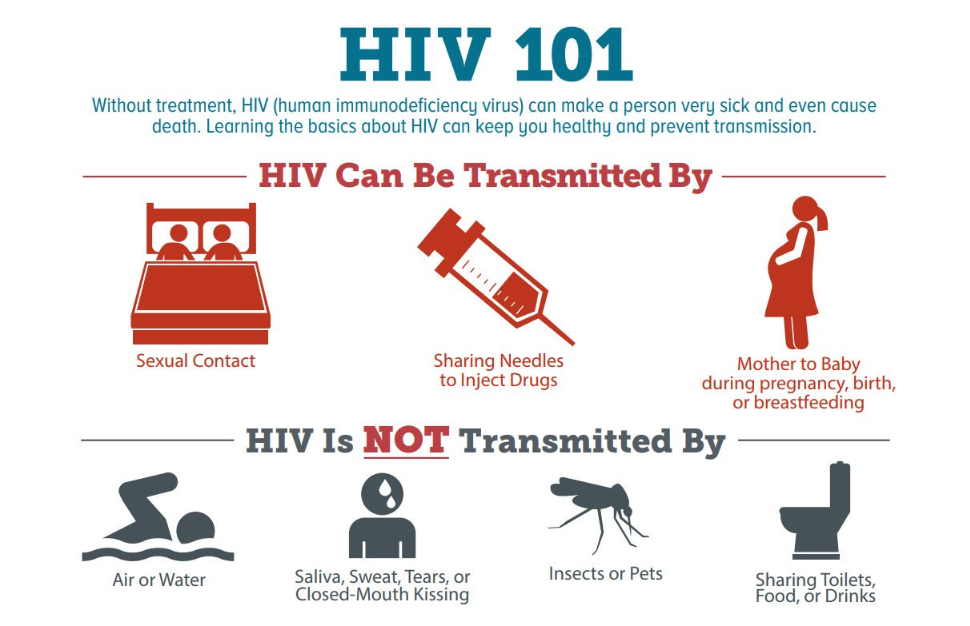HIV Prevention Resources & FAQ
What is HIV? |
HIV stands for human immunodeficiency virus. It is the virus that can lead to acquired immunodeficiency syndrome or AIDS if not treated. HIV is a virus spread through certain body fluids that attacks the body’s immune system, specifically the CD4 cells, often called T cells. Over time, HIV can destroy so many of these cells that the body can’t fight off infections and disease. These special cells help the immune system fight off infections. Untreated, HIV reduces the number of CD4 cells (T cells) in the body. This damage to the immune system makes it harder and harder for the body to fight off infections and some other diseases. Opportunistic infections or cancers take advantage of a very weak immune system and signal that the person has AIDS
|
Is there a cure for HIV? |
No effective cure currently exists, but with proper medical care, HIV can be controlled. The medicine used to treat HIV is called antiretroviral therapy or ART. If people with HIV take ART as prescribed, their viral load (amount of HIV in their blood) can become undetectable. If it stays undetectable, they can live long, healthy lives and have effectively no risk of transmitting HIV to an HIV-negative partner through sex. Before the introduction of ART in the mid-1990s, people with HIV could progress to AIDS in just a few years. Today, someone diagnosed with HIV and treated before the disease is far advanced can live nearly as long as someone who does not have HIV.
|
Prevention
There are many steps that can be taken to prevent HIV. Although abstinence (not having sex) is the only strategy that is 100% effective in preventing HIV, there are more tools available today to prevent HIV transmission than ever before.
- Get Tested
- Your life and health matter. Knowing your HIV status is the first step to ensuring that you are taking the right path for your overall wellbeing. Through our MPower! Albany Program (insert hyperlink to Mpower page), we are able to provide HIV testing and access to PrEP, as well as basic HIV/STI education.
- Learn About It
- Using condoms (male condoms, female condoms, dental dams, etc.) when you have anal or vaginal sex can help protect you and your partners from HIV and other sexually transmitted diseases (STDs). Condoms are highly effective in preventing HIV infection when used correctly every time you have sex. Using a water-based or silicone lubricant helps to prevent condoms from breaking or slipping off during sex.
- Pre-exposure prophylaxis (PrEP) is a powerful HIV prevention tool and can be combined with condoms and other prevention methods to provide even greater protection than when used alone. When taken consistently, PrEP has been shown to reduce the risk of HIV infection in people who are at high risk by up to 92%
- Reduce The Risk!
- Talking to your partner about safer sex allows you to make an informed decision on HIV prevention.
- Never share your needles or works with anyone. The risk of HIV transmission from drug injection is extremely high.
- Get tested and treated for other STDs and encourage your partners to do the same.
Testing with OraQuick
OraQuick: an innovative self-testing strategy that makes HIV testing easily accessible from the comfort of your own home.
To see if you're eligible for OraQuick Click Here
Or receive a link to your mobile device by texting the word TEST to 40457.
Eligible participants will be emailed a discount code and instructions for redeeming a free self-test kit via the OraSure Technologies, Inc website.
To see if you're eligible for OraQuick Click Here
Or receive a link to your mobile device by texting the word TEST to 40457.
Eligible participants will be emailed a discount code and instructions for redeeming a free self-test kit via the OraSure Technologies, Inc website.
Sources:
- https://wwwn.cdc.gov/hivrisk/best_actions/ - http://www.gmhc.org/prevent-hiv-22

